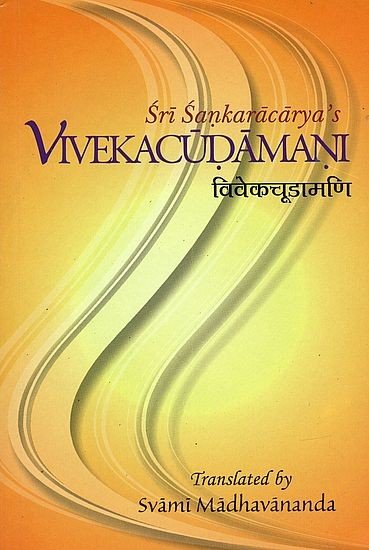Vivekachudamani
by Shankara | 1921 | 49,785 words | ISBN-13: 9788175051065
The Vivekachudamani is a collection of poetical couplets authored by Shankara around the eighth century. The philosophical school this compilation attempts to expose is called ‘Advaita Vedanta’, or non-dualism, one of the classical orthodox philosophies of Hinduism. The book teaches Viveka: discrimination between the real and the unreal. Shankara d...
Verse 248-249
स देवदत्तोऽयमितीह चैकता
विरुद्धधर्मांशमपास्य कथ्यते ।
यथा तथा तत्त्वमसीतिवाक्ये
विरुद्धधर्मानुभयत्र हित्वा ॥ २४८ ॥संलक्ष्य चिन्मात्रतया सदात्मनोः
अखण्डभावः परिचीयते बुधैः ।
एवं महावाक्यशतेन कथ्यते
ब्रह्मात्मनोरैक्यमखण्डभावः ॥ २४९ ॥sa devadatto'yamitīha caikatā
viruddhadharmāṃśamapāsya kathyate |
yathā tathā tattvamasītivākye
viruddhadharmānubhayatra hitvā || 248 ||saṃlakṣya cinmātratayā sadātmanoḥ
akhaṇḍabhāvaḥ paricīyate budhaiḥ |
evaṃ mahāvākyaśatena kathyate
brahmātmanoraikyamakhaṇḍabhāvaḥ || 249 ||248-249. Just as in the sentence, "This is that Devadatta", the identity is spoken of, eliminating the contradictory portions, so in the sentence "Thou art That", the wise man must give up the contradictory elements on both sides and recognise the identity of Ishwara and Jīva, noticing carefully the essence of both, which is Chit, Knowledge Absolute. Thus hundreds of scriptural texts inculcate the oneness and identity of Brahman and Jīva.
Notes:
[Contradictory portions—Such as the differences of time and place etc. ]
